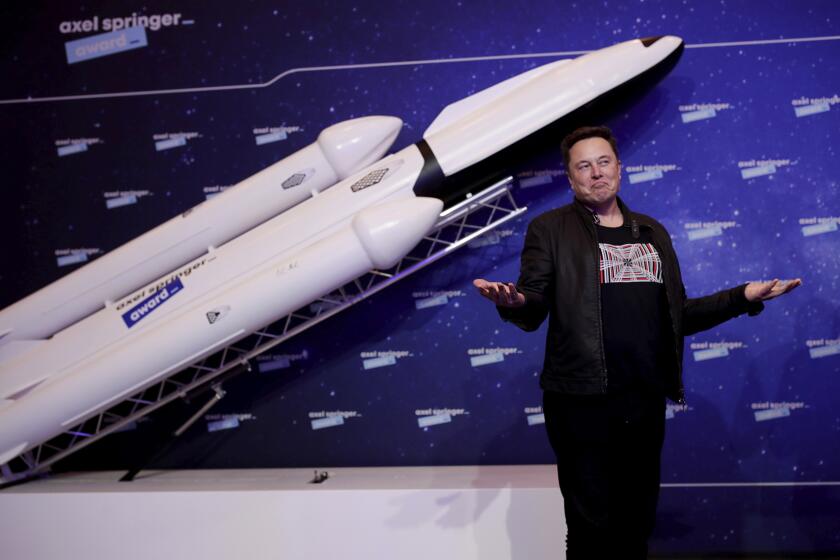These are all the legal sagas Elon Musk is involved in (this week)

- Share via
As the world’s richest man and a lover of controversy and public spectacle, Elon Musk is never far from the headlines. But this week, it seemed like he was in all of them.
There was, of course, the Tesla billionaire’s successful negotiation of a deal to purchase Twitter for $44 billion. But there were also a slew of lawsuits and legal proceedings that featured Musk as a primary or minor character, from regulatory scrapes to shareholder tussles to a Hollywood couple’s scorched-earth divorce aftermath.
Having trouble keeping it all straight? Here’s a rundown of Musk’s latest legal entanglements.
Delayed disclosure on Twitter
Though Musk’s plan to take Twitter private doesn’t raise typical antitrust concerns around concentration of ownership, it’s already receiving scrutiny from regulators because of an antitrust law.
The Federal Trade Commission has opened an inquiry into whether Musk complied with an antitrust reporting requirement while amassing his stake in Twitter between the end of January and the beginning of April, the Information reported. Musk categorized his stock purchase as a passive stake — indicating he would not be trying to influence the company.
The inquiry will look into whether Musk saw himself as a passive shareholder when initially buying, or if he had intentions to influence Twitter management, according to the Information.
Musk also filed a notice with the Securities and Exchange Commission several days late when disclosing his 9.2% stake, which is required when an investor buys more than 5% of a company’s stock.
On the Heard vs. Depp witness list
Musk is no stranger to high-profile defamation trials: In 2019, he successfully defended himself after publicly suggesting that a British cave diver who had criticized him was a pedophile.
But this week it was Musk’s ex-girlfriend, actress Amber Heard, who stood accused of defamation by her ex-husband, Johnny Depp, in a $50-million lawsuit. Musk’s name appeared on the witness list.
Elon Musk has appeared to waste no time before violating his merger agreement with Twitter.
Depp sued Heard for writing an op-ed in the Washington Post referring to herself as a “public figure representing domestic abuse.” The piece did not refer to Depp by name, but the actor asserted it clearly referred to their relationship and ruined his reputation as a result.
Musk, 50, dated Heard for a year after her relationship with Depp ended in 2016.
Musk will not be testifying at the trial, his attorney told the New York Post on Wednesday. But Heard’s talent agent, Christian Carino, testified about a text message exchange in which he told Heard, “You weren’t in love with him and you told me a thousand times you were just filling space,” and she replied, “I know.”
Vindicated in SolarCity suit
A judge ruled in favor of Musk on Wednesday in a $13-billion lawsuit over Tesla’s acquisition of SolarCity, a struggling rooftop solar panel maker with which he had deep financial and business ties.
Tesla shareholders accused Musk of coercing the board into making the purchase — a $2.6-billion all-stock deal — as a “bailout” for the solar company, their attorney said. Musk was SolarCity’s chairman and largest shareholder, and his cousins, Lyndon and Peter Rive, founded the company in 2006.
Musk has said the deal was part of a “master plan” to transform the production of sustainable energy.
Although he chastised Musk for involving himself despite his conflict of interest, Vice Chancellor Joseph Slights of Delaware’s Court of Chancery ultimately ruled in his favor.
In his decision, Slights said Tesla paid a “fair price” for SolarCity and the acquisition was “highly beneficial” to Tesla. The company’s shareholders can still appeal the ruling.
The tweet that lives on in lawsuits
A 2018 settlement with the SEC over a Musk tweet claiming he had “funding secured” to take Tesla private at $420 a share has been a thorn in his side ever since.
This week, Musk failed in his attempt to get out from under that settlement, which, among other things, requires him to get preapproval for some of his tweets from lawyers.
The “funding secured” tweet sent Tesla’s stock soaring, but Musk later revealed in a blog post that there was no concrete funding in place and he was still talking to investors. That led to a securities fraud charge and the settlement, under which Musk and Tesla each paid $20 million and Musk gave up his Tesla chairmanship for three years, along with the mandatory “Twitter sitter.”
After Musk tweeted about potentially selling a large portion of his holdings in Tesla last November without obtaining approval, the SEC served him with a subpoena for violating the settlement agreement. He’s also being investigated for potential insider trading because of that tweet, as his brother Kimbal Musk sold $108 million worth of his shares a day before he posted it. Tesla’s stock dropped sharply after the tweet.
Musk accused the SEC in February of a harassment campaign that restricted his right to free speech and filed a motion to end the settlement.
U.S. District Judge Lewis Liman denied the motion Wednesday, calling Musk’s argument “meritless” and “particularly ironic,” as Musk should have known he was waiving his 1st Amendment rights when entering into the agreement.
Meanwhile, Musk also faces a trial in May in a lawsuit brought by Tesla shareholders over the “funding secured” tweet.
Playing defense on discrimination
Amid all this, Tesla has been facing parallel investigations over racial discrimination by California’s Department of Fair Employment and Housing as well as the U.S. Equal Employment Opportunity Commission.
California’s civil rights agency filed a lawsuit against the company in early February on behalf of thousands of Black workers after a decade of complaints and a 32-month investigation. The lawsuit alleged the employees endured co-workers using the N-word and other racist slurs daily at Tesla’s Fremont, Calif., plant. It also alleged Black workers were denied promotions, paid less than other workers for the same jobs and retaliated against for complaining about racist treatment.
Last week, Tesla said in a legal filing that the EEOC had opened an investigation into the electric vehicle company before the state agency did in 2019. The company asked a judge to block the state’s lawsuit, accusing the DFEH of filing it to advance its “turf war” with the federal agency.
At least 160 worker lawsuits have been filed against Tesla since 2006, according to Plainsite, a court document transparency organization.
More to Read
Inside the business of entertainment
The Wide Shot brings you news, analysis and insights on everything from streaming wars to production — and what it all means for the future.
You may occasionally receive promotional content from the Los Angeles Times.












